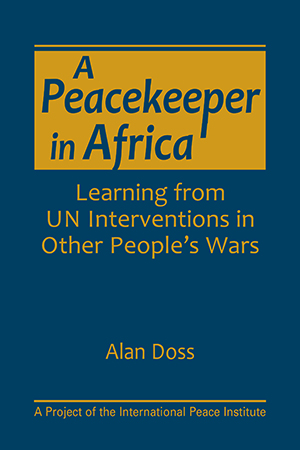A Peacekeeper in Africa:
Learning from UN Interventions in Other People's Wars
Alan Doss
Alan Doss offers a rare window into the real world of UN peacekeeping missions in Côte d'Ivoire, Liberia, Sierra Leone, and the Democratic Republic of Congo.
Doss's story is one of presidents and prelates, warlords and warriors, heroes and villains, achievements and disappointments—and innocent people caught in the midst of deadly violence. As he shares his front-line experiences, he reflects on the reasons for successes and failures and on the qualities that leaders need to successfully guide efforts to rebuild peace and prosperity in devastated societies. Not least, he also considers the UN's future role in conflict prevention and peacekeeping in a climate of increasing resistance to intervention in "other people's wars."
Alan Doss served, among other peacekeeping posts in Africa, as special representative of the UN Secretary General in the DRC and Liberia and head of the UN peacekeeping mission in the DRC. He has recently retired from his position as president of the Kofi Annan Foundation.
"Offers great insights ... and deserves many readers among both scholars and practitioners."—Ulf Engel, Connections: A Journal for Historians and Area Specialists
"To read this book is to understand what the UN can (and cannot) do in conflict management."—Colonel Matthew Whitchurch, Royal Engineers Journal
"A fascinating book from a peacekeeper who has seen much but is still grasping for answers."—Stephen Williams, African Business Review
"Offers a thoughtful guide to the inner workings and problems of UN operations."— Richard Gowan, World Politics Review
"This book is first-rate…. Alan Doss provides a thoughtful, engaging account of the UN’s work in African conflict zones, told from a unique vantage point; he also asks the reader to grapple with a series of difficult strategic questions, which the last chapters address head-on. The pages meld remarkable experience with a keen analytic mind and great sensitivity. They take us on a journey through Sierra Leone, Liberia, Cote d'Ivoire, and the DRC, as well as through a rethinking of the UN's important work in some of the world's most difficult situations." —Jennifer Widner, Princeton University
"An absorbing and incisive study of peacekeeping at the coalface, offering the reader a detailed and highly readable insider’s account of the realities of UN field operations during and in the aftermath of civil war…. This is precisely the kind of book needed to bring out the limitations as well as the possibilities of UN peacekeeping. Highly recommended."—Mats Berdal, King's College London
"Heading a UN peace operation is one of the hardest jobs in the world, and Alan Doss was among the best…. Doss provides a fascinating, up-close account of complex operations [in Africa], while reflecting on the state of contemporary peacekeeping. His book should be of great interest to anyone who wants to understand what it takes to end wars." —Ian Johnstone, Fletcher School of Law and Diplomacy, Tufts University
"Superb … both readable and insightful. Alan Doss served at the highest levels of peacekeeping in [Africa], and this book richly draws learning from that experience. A must read for policymakers, scholars, or the just curious seeking to understand the success and setbacks of UN peacekeeping … over the last twenty years and what its future might be."—Alex Vines, Chatham House
"Alan Doss is a development professional who brought the perspective of a nation builder to the peacekeeping task. Alan understood that the only viable exit from modern peacekeeping is building viable states. This is his fascinating story of how he tried to do that." —Lord Mark Malloch-Brown, former Deputy Secretary General of the United Nations
"With this book Alan Doss has reinvigorated the debate about peacekeeping…. He draws on his decades-long experience in the field to offer a compelling, engaging and insightful account of both possibilities and pitfalls."—Zeinab Badawi, host of BBC's History of Africa series
"An insightful account by a seasoned UN diplomat on his leadership in four major conflicts on the African continent. Doss not only openly details the crucial steps [taken] and challenges he encountered . . . but also willingly offers the reader forthright explanations and justifications for the choices he made. The book offers some important analysis and policy dilemmas for today's peacekeepers and the United Nations as it grapples with some complex global conflicts." —Comfort Ero, Africa Director, International Crisis Group
"Whoever convinced Alan Doss to write this book has done justice not only to him but to history. It is a brilliant piece of work." —Zainab Bangura, Former Foreign Minister, Sierra Leone
"Peacekeeping where there often is little peace to keep is one of the world's toughest jobs. No one understands this better than Alan Doss, who has lived it and reflected on it deeply. This extraordinary book combines insights and lessons for those who make policy and those who try to make it work in some of the most difficult contexts."—John Ruggie, Harvard Kennedy School
"Few people have the peacebuilding experience of Alan Doss. Stabilising and fixing failed states involves devising and implementing complex solutions to intricate problems, keeping partners onside and moving forward. From Congo to Liberia, facilitating local ownership and aligning foreign assistance requires at its heart decisive and adroit leadership. Read this outstanding memoir, and learn."—Greg Mills, Brenthurst Foundation
- Foreword—Terje Rød-Larsen.
- A Journey in Peacekeeping.
- THINGS FALL APART: WEST AFRICAN WARS.
- Sierra Leone: The Search for Peace.
- Côte d'Ivoire: The War of Succession.
- Liberia: From War to Peace.
- WARS WITHOUT WINNERS: PEACEKEEPING IN THE CONGO.
- Into the Cauldron: Congo Past and Present.
- Crisis Without End: The Kivu Wars.
- The Contagion of Conflict: Other Places, Other Wars.
- Pursuing Peace: Stabilization, Peacebuilding, and Transition.
- OUT OF THE SHADOWS: THE PROMISE OF PEACE.
- Great Expectations: Intervention and Its Conceits.
- Pipe Dreams and Possibilities: Navigating Pathways to Peace.
- MOVING FORWARD: PEACEKEEPING TODAY AND TOMORROW
- A Job Like No Other: Leading Peacekeeping Missions.
- Facing the Future: Actions for Peace.








